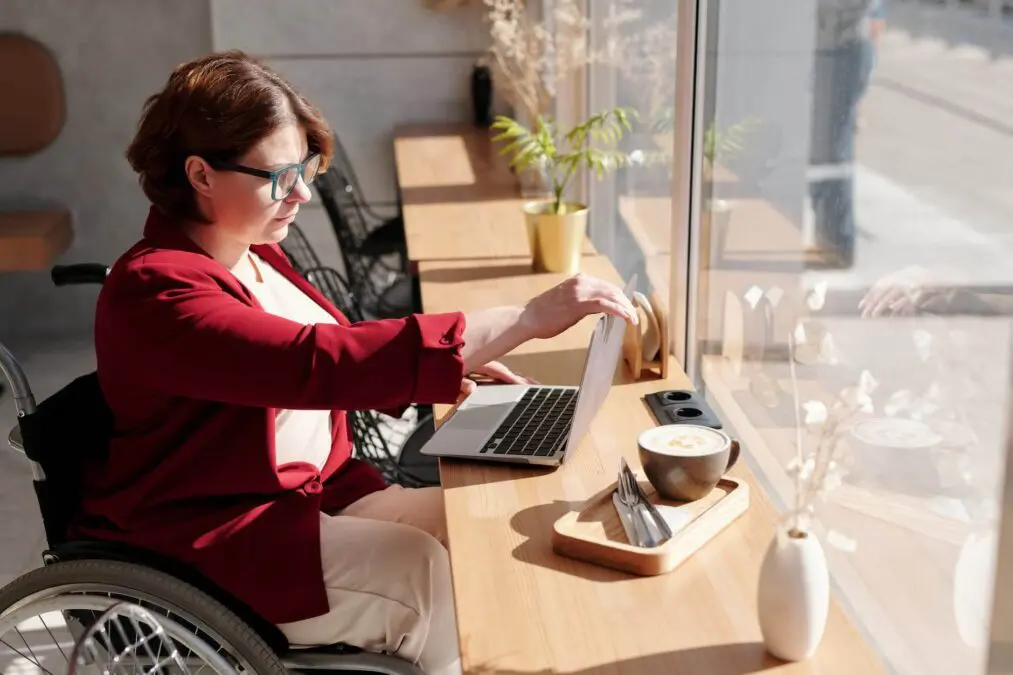Building back better: people with disabilities in the workforce
Ayse is a social worker in Holbæk Kommune, Denmark, who works to support people with disabilities. As someone with a hearing impairment, Ayse has a disability herself and sometimes utilizes an interpreter in her role – bringing a unique perspective to her work.
When asked about workplace environments, employment challenges and standards of inclusivity for people with disabilities, she explains: “I have struggled a bit applying for jobs, it has been a difficult process for me and I know other people with disabilities who have the same problems”.
“For instance, I struggled to get a job as a social worker for 7 months. I went to several job interviews and they thought I was qualified for the job, but they had a hard time accepting my disability because I come with a personal assistant – a sign-language interpreter. They believed having an interpreter at the workplace would be a challenge. This is a result of a lack of knowledge among employers about my disability.
“In reality, it’s not a problem to employ a person with a disability. In Denmark we have compensation measures that ensure employers will not face any extra expense in employing someone like myself who has a disability. For example, I get 20 hours of interpretation a week paid by the government to support my work.
“No matter someone’s disability, communities have to provide the best possible conditions for us to enter a workplace. Workplaces and colleagues should have the right knowledge about the barriers we face to be prepared to welcome us, as well as checking on how we are coping in a new role.”
Bringing a new perspective
Ayse also explains that sometimes she feels her disability allows her to better connect with her clients, adding that she understands some of the challenges and barriers they face, and that employers should recognize this as a strength. “If we don’t get a chance, it’s completely hopeless; but when we get a chance, we can show what we can do, that we have the ability to do a job regardless of the disability that we have, and do it just as well as a person without a disability.”
She speaks highly of her employer, manager and colleagues, who have made her feel welcome in her role, adding that the social aspects are also important: “The people I have worked with have been very good. Sometimes they write me a little note about what they’ve been talking about – and they’re very good at asking me to join certain activities, which makes me feel very included”.
International Day of Persons with Disabilities
Today marks the International Day of Persons with Disabilities and this year’s theme is “Building back better: toward a disability-inclusive, accessible and sustainable post COVID-19 world”.
People with disabilities have suffered disproportionally during the COVID-19 pandemic – often finding themselves unable to access the support they need. This can affect their everyday life, including their ability to work if the necessary support is unavailable.
An important part of building back better from COVID-19 includes ensuring that people with disabilities are able to work without fear of discrimination, while also making working environments as inclusive and supportive as possible.
Strengthening inclusive workplaces
WHO has recently launched a new policy for disability, which commits to ensuring that people with disabilities are included and thrive within WHO. The policy is relevant for all levels of the WHO workforce, seeking to make the Organization more inclusive for people with disabilities and acting as the primary framework for implementing the United Nations Disability Inclusion Strategy. WHO/Europe will begin rolling out the new policy next year.
Part of the European Programme of Work (EPW) – “United Action for Better Health”, includes working with non-state actors. Recently, Dr Hans Henri P. Kluge, WHO Regional Director for Europe, met virtually with representatives of the European Disability Forum.
Protecting the rights of people with disabilities to access the health-care services they need on an equal basis is strongly reflected in the 3 core priorities of the EPW: guaranteeing the right to universal access to quality health care without fear of financial hardship; protecting against health emergencies; and promoting health and well-being.
Giving everyone a chance
When asked what the most important thing an employer can do to be inclusive is, Ayse’s answer is simple: “the most important thing is that they give people with a disability a chance to work there”.
“We’ve got the abilities to work in this field but we’re never really given a chance. That is the greatest issue for me. My manager and colleagues, the people I work with don’t see me as a person with disability, but they have to have that experience of working with me to see that that things work very well with an interpreter.
“How do we start? We need to be able to put our skills and qualifications into action. So the most important thing for me is that we are given a chance. That is how we can evolve – both with our professional skills and socially.”







